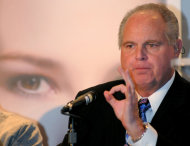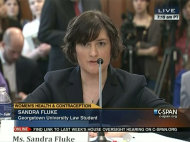By STEVE PEOPLES and KASIE HUNT
Associated Press

MEMPHIS, Tenn. (AP) -- Intensifying debate over conservative social values - and Republican icon Rush Limbaugh - overshadowed the nation's economic concerns Sunday as the Republican presidential campaign hurtled toward Super Tuesday contests that could re-shape the nomination battle and shift the direction of the Grand Old Party.
Mitt Romney and Rick Santorum distanced themselves from Limbaugh, who boasts a huge conservative following and recently apologized for calling a Georgetown University law student a "slut" and a "prostitute" on his nationally syndicated radio program. The woman testified at a congressional hearing in favor of an Obama administration mandate that employee health plans include free contraceptive coverage. While religious institutions are exempt, their affiliates, such as hospitals and universities, were at first included in the requirement. Under harsh criticism from conservatives, President Barack Obama later said the affiliates could opt out, but insurers must pay for the coverage.
The GOP framed the issue as one of religious liberty. But Obama's chief political strategist suggested the Limbaugh's reaction - and Republicans slow repudiation of his comments - would benefit Democrats in the general election this fall.
"I think what Rush Limbaugh said about that young woman was not only vile and degrading to her, but to women across the country," David Axelrod said on ABC's "This Week" Sunday morning.
While the contraception debate raged on national television, Newt Gingrich predicted a strong performance Tuesday would resurrect his fading candidacy. Romney and Santorum spent Sunday racing across Georgia, Tennessee, Oklahoma and Ohio, four of the ten states to host elections on Super Tuesday, the biggest single voting day of the 2012 cycle.
Campaigning in Alaska, Ron Paul conceded he's a long shot.
"Do I believe I can win? Yes. Do I believe the chances are slim? Yes, I do," he said on CBS' "Face the Nation."
Super Tuesday's defining contest may be Ohio, where Santorum and Romney have devoted tremendous time and resources in recent weeks. Santorum's performance there could well define his fate - and Romney's - in the rollercoaster race going forward.
"This is a game of survival," Santorum said while campaigning Sunday in Memphis, Tenn.
Preparing for the worst, Romney's campaign began preparing for a possible loss in Ohio, where polls show the former Massachusetts governor locked in a dead heat with Santorum, a former senator from neighboring Pennsylvania.
"I don't think any state is a must-win," Romney adviser Eric Fehrnstrom said. "I think the only must-do on a candidate's check list is getting 1,144 delegates."
Romney has won four consecutive contests, including Saturday's Washington caucuses. His broad, well-disciplined organization virtually assures he'll collect more delegates than his opponents on Tuesday, in contrast with Santorum's looser group of supporters. Santorum and Gingrich did not collect enough signatures to qualify for the Virginia ballot, for example, and Santorum cannot win 18 of Ohio's 66 delegates for similar reasons.
But a win by the overmatched Santorum in Ohio would send a broad signal that Romney, long presumed the front-runner, is far weaker than anyone imagined. Gingrich said as much Sunday.
"Gov. Romney, who's outspent all the rest of us by multiples, is a front-runner without any question, but I think he's not a very convincing front-runner, and he's a long way from having closed out this race," he said.
On the other hand, a Santorum loss in Ohio, coupled with a convincing Gingrich victory in Georgia, could breathe new life into the former House speaker's candidacy and impede Santorum's greatest wish: a one-on-one contest against Romney.
"For us to ultimately win this race is going to have to narrow down to two, and I think that will happen eventually," Santorum said in Memphis.
But Gingrich is showing no signs of going away.
The former Georgia congressman has declared the state he represented for 20 years a must-win. He holds a strong lead in recent polls there. On Sunday he predicted the race would go on "for a good while."
No candidate will sweep all 10 contests - which feature in some cases complicated delegate rules and span politically diverse regions from Alaska to Vermont to Oklahoma.
But a Santorum victory in Ohio or broader success elsewhere will likely ensure his place as Romney's top rival. And that would help ensure that the contraception debate and other social issues play prominently in the Republican presidential contest going forward. Santorum has made headlines in recent days by emphasizing the need for two-parent families and fewer pregnancies out of wedlock. Saturday night, Santorum told an Ohio audience that the nation's inattention to conservative social values is "damning people."
In Oklahoma City on Sunday, Santorum was greeted by protesters who shouted slogans like "Get your hate out of my state." As Santorum supporters chanted "We pick Rick," the candidate himself was barely audible.
Earlier, he dodged the Limbaugh controversy. "That's not my business," he said when asked Sunday about Limbaugh's apology.
Romney has avoided the issue in recent days as well, saying only that Limbaugh's comments about the college student were "not the language I would have used, but I'm focusing on the issues that I think are significant in the country today, and that's why I'm here talking about jobs in Ohio."
Asked whether Romney's comments went far enough, Fehrnstrom said: "There's extreme rhetoric on both sides of the political spectrum. I think the political process is best served if everybody tones it down, not only those on the right but also intolerant voices on the left."
Gingrich told CNN's "State of the Union" that he's glad the conservative commentator issued the apology on Saturday and that it's time to move beyond the controversy. He said it's "silly" to suggest that Limbaugh speaks for the GOP.
Republican observers suggest that any continued focus on social issues could hurt the party.
GOP strategist Phil Musser said the contraception debate "has been distracting and has sucked up too much political oxygen."
"While this is an important issue that illustrates the overreach of Obamacare, it's nowhere near the top of what most Americans are most focused on right now," he said, describing it as a "short-term challenge."
Santorum's focus on social issues has helped fuel his success in lower-turnout elections, where tea party activists and evangelical voters generally play a more active role. Lingering skepticism about Romney's conservative credentials from those voters has allowed Santorum and Gingrich to stay in the race, despite Romney's advantages.
The Super Tuesday contests and beyond are about math almost as much as political symbolism.
No candidate can technically claim his party's nomination before collecting 1,144 delegates, although history suggests a nominee usually emerges much earlier once weaker candidates lose the ability to raise money.
Romney holds a commanding delegate lead, including Saturday's Washington results, according to Associated Press projections.
He won 30 delegates in Washington while Paul and Santorum each won five, bringing Romney's total to 203, compared to 92 for Santorum, 33 for Gingrich and 25 for Paul.
There are 419 delegates at stake Super Tuesday. Also, Wyoming Republicans will hold county conventions from March 6 through March 10, with 12 delegates to the party's national convention up for grabs.
---
Associated Press writer Katie Fretland in Oklahoma City contributed to this report.










 March 4 - March 10
March 4 - March 10








